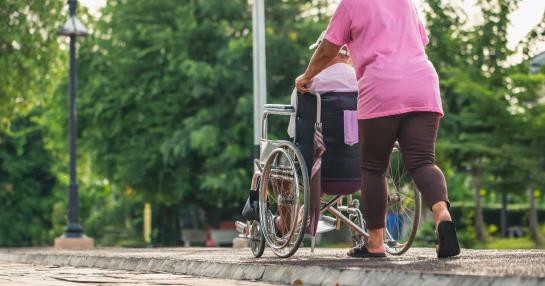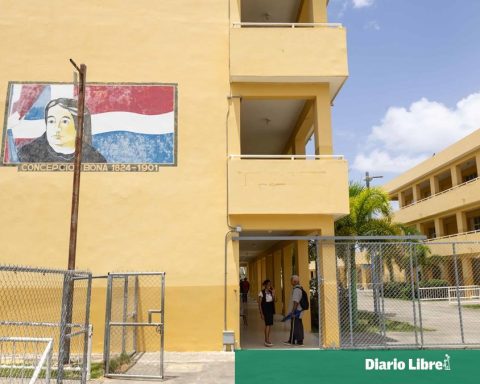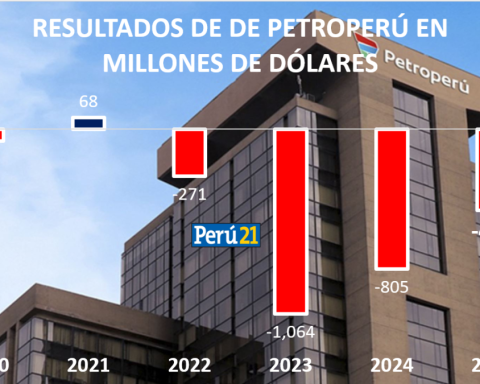Vacant: looking for a person to work seven days a week and be available 24 hours a day. She is required to be an expert in housework and will be responsible for the care of two children and a person over 81 years of age.
The contract is indefinite. There are no vacations and salary is not in dispute because there will be no pay for the position. Would you do this job? This is the work that Josefina (fictitious name, because she preferred not to be identified) does every day, a single mother living in Santo Domingo Este, and who does not have a paid job.
Josefina gets up every day at 5:00 am to finish the preparations she started before going to bed. Care items, clothing, shoes, and school supplies must be in the cabinet; She thus avoids waking up her mother, whom she leaves sleeping, with breakfast prepared and the medications that she must take in the morning, while she takes the children to school.

“I’ll leave her with Papa Dios,” commented Josefina. On Mondays, Wednesdays and Fridays, he travels from kilometer 13 and a half of the Las Américas highway to Gascue, in the National District, to take his 10-year-old girl, who has Down syndrome, to a center that trains her so that achieve the highest level of independence possible. On Tuesdays and Thursdays she takes the boy to school, who receives remote teaching the other days.
When her mother needed surgery earlier this year, Josefina had to take the children with her, as she had no one to leave them with. When asked who takes care of her, Josefina only replied that no one, not even herself, because she can’t even find time to go to the doctor, although she admits that she needs it, since sometimes she feels severe headaches accompanied by dizziness and nausea.
Josefina’s mother has two sons, but she is the one in charge of taking care of her mother. “I have been about to throw in the towel,” said Josefina worriedly, because being in charge of caring for three people is exhausting for her. She only has the financial help that the children’s father gives her; support that she affirms she must stretch it as much as possible to achieve a month.
“I get headaches with dizziness, nausea… Ah! I don’t have time to go to the doctor”Single mother taking care of three people
On the other hand, there is Mercedes de la Cruz, 65 years old. She has been taking care of her mother Altagracia Molina for almost a year, who will turn 90 at the end of this month. “I have been so stressed that I have lost 10 pounds. I have to think about it a lot because she scares me that she is going to get hurt, ”said De la Cruz about how she changed her dynamics now that she has to take care of her mother. Mercedes does not consider that she is doing a job because taking care of her parent is a job that she does with love. In addition to keeping an eye on Altagracia, Mercedes must take care of the housework, where she lives with her husband, her daughter and her grandchildren.
In the Dominican Republic, women spend an average of 31.2 hours a week Unpaid work, while men perform 9.6 hours, according to data from the National Statistics Office (ONE). “The difference of 21.6 hours is evidence of the great gender inequalities, at a disadvantage for women, in the performance of tasks that are carried out without pay and without social recognition,” highlighted the ONE.
In the specific case of care workThis one has a woman’s face. On average, women spend 15.7 hours a week caring for someone, compared to 3.1 for men. Regardless of socioeconomic level, women spend more time caring for others; the less income they have, the lower their educational level, the more hours they spend; they spend more time if they live in rural areas. Even if they work, are retired or have a disability, women care more than men.
At some point in life, a person will require the care and attention of other people, especially older adults to the extent that life expectancy is extended. This work falls mainly on women, not only in the Dominican Republic, but also in the Latin American and Caribbean region.
Hence the concept of care economy, that feminist approach that came to question the microeconomic foundations of economic theory. “It comes to want to revalue and make visible all that work that is not monetized but is essential for economic development, as for the development of a society,” explained Rosa Cañete, director of Analysis of Poverty, Inequality and Democratic Culture of the Ministry of Economy .
15.7 Average hours per week women dedicate to care work in the Dominican Republic.
Cañete explained that the State does not intervene with public care policies and neither does the private sector, the issue is relegated to the private sphere of households.
“Inequalities are generated in the roles that each one executes, and it ends up being assumed, mainly, by women, who do their best to cover this gap in public policies. But this entails very strong inequalities when it comes to accessing their economic autonomy, the labor market, ”she said.
The economist spoke about the importance of seeing care as a right that people should demand.
The Government is preparing a program called Care Communities, which seeks to take advantage of the potential of care as a key axis for social investment, the creation of new jobs and economic reactivation. Although care is assumed by women, the project will have an impact on Supérate homes regardless of who is in charge, said Cañete.
Claudia Saleta, director of Care at Supérate, stressed that the program will help promote the autonomy of women from Supérate to participate in dignified conditions in different areas of the economy and facilitate their employment in care services in their communities.
The project report revealed that there is an estimate that 30% of women of working age in Supérate households report that they are not looking for work because they are housewives. Care Communities is planned to start in the municipalities of Azua, Bánica and Santo Domingo Este and its implementation will help 27,150 women over 15 years of age dedicated to unpaid care work to obtain this service from the State to free themselves from that time that they will be able to invest to train and integrate into the labor market.
















